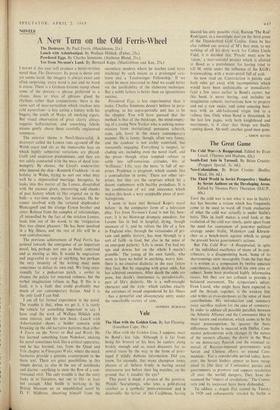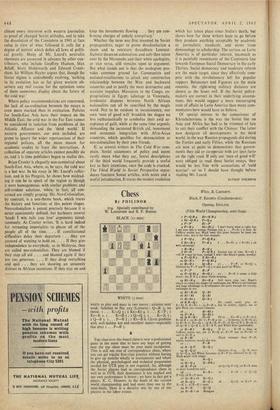about a year ago with a hard luck story about
he jumped at the chance of taking it, as a tem- porary measure, at £1 a week, which was half what he had been paying before. It was soon possible to deduce why the Ms had found them- selves without. a roof over their 'heads; they simply don't believe, on principle, in paying rent. Emissaries, sent to persuade them of the error of their ways, found the bungalow full of ex- pensive furniture, transistor radios, an impressive television set and brand-new toys for the children; Mrs. M was charming, always promised to come in next week and settle up, but never came. Eventually we wrote and gave them notice. Nothing happened. We wrote again—still nothing happened—and again. Now, God knows why, something has happened. Just, my luck.
'You know you really ought to pay your rent, Mrs. M,' I say in what is intended to be a firm manner. 'I mean, everybody else does. It's a sort of duty, really. After all, I did try to help you and it is my house. It isn't as if--' Something—sheer boredom, most likely—has knitted up Mrs. M's ravelled sleeve of care. She has stopped blubbing. 'Here's twelve pounds,' she says, unaccountably producing a wad of notes. 'I know it's not quite enough, but I'll come in next week and settle up. Promise.'
Dazed by this success, I am in a fair way to overlooking the fact that half the morning has been wasted; but by the time the rest of it has been sacrificed to Rachmanship my morale has slumped again. I have offended Mrs. G by failing to realise that her sister in Australia, after whom.
custom, I inquired, expired two months ago; I have lost face badly with Mrs. X and Mrs. Y (who also brought the rent of Mr. Z, temporarily laid low) by my inability to find the key of the office safe when they wanted change, and by getting all their rent-books mixed up. I am left with a sense of failure.
I believe, nevertheless, that if Mr. Crossman could be persuaded to stand in for me on one of these Mondays it would not do him any harm.
Afterthought
By ALAN BRIEN
DISLIKE at first sight is a far more common phe- nomenon in my experience than love at first sight. There are some superficial, tell-tale male habits which immediately warn me against the person who has developed them. One is the wearing of an armoury of pens and pencils in the breast pocket of the jacket.
Here, you can be sure, is someone determined to let you know that he is'a self-made egg-head, probably a scientist or a technician, and the fastest man on the draw with a Biro in the district.
He cannot direct you from Leicester Square . to Piccadilly Circus without constructing an elaborate map on squared paper and marking in the points of the compass. He keeps the waiter waiting while he divides up the bill, adds an allowance for your smoked salmon (7s. 6d. extra), subtracts a rebate for his refusal of coffee, then asks for elevenpence change to arrive exactly at a 121 per cent tip. He takes every- thing you say literally and continually drags • down the free-floating, fantasy-filled balloon of conversation to earth by pointing out that there are no tigers in Africa, or that French for cul-de- sac is impasse, or that the Battle of Hastings was fought at Battle, near Hastings. He is the only member of the group who knows, or cares, about
• the correct formulation of the Second Law of Thermodynamics or the proper method of con- verting Fahrenheit into Centigrade. He is the
• schoolmaster who never grew up, begotten by H. G. Wells upon the person of C. P. Snow. He is a pedant about split infinitives, the , position of the circumflex, the pronunciation of
• 1'controversy,' and his great ambition is to be able
' to afford a watch which also tells „the date, and possibly the barometric pressure at Greenwich. If, behind his barricade of scribbling instruments, he carries a comb as well-then you are really lost. For that means he is vain about his silly little face, keeps a nail file and mirror in his wallet, and is given to kidding waitresses, teasing secretaries and opening doors for other people's wives.
puts all his loose change in a leather pouch with a zip-but an occasional, fortunately rare, speci- men has been observed. It is not for nothing that the Roman Catholic Church, in its psychological cunning, insists that its priests shave all the face or none of it. A moustache is a gesture both timid and frivolous, insecure and extrovert at once, like a naked man in his socks and suspenders. It is consciously an attempt to add extra tire-power and aggressiveness to a null, pacific countenance. Unconsciously, it betrays a defensive, self-pro- tective need to erect a hairy fortification against violation of the painfully exposed facial orifices of the nose and mouth. All moustaches are reve- lations of the Maginot Line mentality, barricades to outwit rapists, strainers to catch and trap runaway expressions of emotion.
The bigger the moustache, the more acceptable it is. When it is bushy enough to tickle the ear- holes, and divide the cheeks like a sabre scar, then at least it is being offered as a joke. It is an essay in self-criticism and earns marks for candour. The worst kind has a break in the middle, and the two middle ends have been re- directed up into the nostrils, like a pair of furry caterpillars bolting for home. Never let your daughter marry a man with a moustache. At the best, she will toughen into a boiling fowl through henpecking him; at worst, the Worm will turn and murder her so inefficiently that he will be helping the police with their inquiries long before the body is dug out of the cabbage patch. dent Cassandra within the gates. The bow tie is the sign that he is half-wild but willing to be tamed, the prophet who ,will not be without profit in his own country. I can't think why Malcolm Muggeridge doesn't wear one.
As for the man who keeps his copper and silver in a leather zipped pouch the shape of a half- moon, have you ever met one who was not fussy, effete, house-proud, tidy, niggling-in other words, a parody in trousers of his poor old mum? He is the character who arranges his books in order of size, empties the ashtray after the first tap of your cigarette, makes lists every week- end, never is out of stamps or cigarettes, pays the telephone bill before the final final notice, has one handkerchief for show and another for use, writes down his collar size in his diary, understands the instructions on how to open a waxed carton of milk, remembers everybody he ever went to school with or was in his hut in the army, fills in his cheque stubs and checks them against his statement, receives and files a receipt for everything. He is always at the head of every queue, shaking his little money bag, searching with a licked finger for the halfpenny which will make up the magically exact amount for whatever he is buying.
He must be the man the Chancellor of the Ex- chequer has in mind when he makes that speech about his job being to run the nation's house- keeping just like any mother of a family. He is probably the only person, a month after budget day, who can tell you to a decimal how much







































 Previous page
Previous page